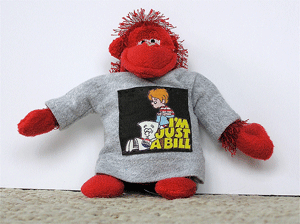
Photo by Flickr user <a href="http://www.flickr.com/photos/29278394@N00/" target="_blank">normanack</a> under Creative Commons
Even before last week’s progressipocalypse, there was a growing sentiment among those on the left that the American political process had some serious mud in its tires. And not just in Washington, either. Perhaps nowhere is democratic decay more pronounced than in MoJo‘s home base of California.
The state’s problems have been well documented (here’s a helpful introduction), but no single element has been more problematic than Prop 13, the 1978 constitutional amendment which stipulates that any tax-raising measure requires a virtually unattainable two-thirds majority in Sacramento. With revenues no longer keeping pace with the state’s needs, the cash-strapped government has been forced to slash essential services and issue I.O.Us to creditors. But help may finally be on the way: University of California-Berkeley professor George Lakoff, a linguist who was once dubbed “the father of framing” by the New York Times Magazine, is pushing to effectively repeal Prop 13 via a referendum this November.
“The linguistics is interesting,” Lakoff told me after a recent event in San Leandro. “When you say ‘supermajority’ it sounds like it’s more democratic, when it’s actually anti-democratic. It’s that little twist on language that’s there, and I think people had no idea about the reality of what was happening—that this is the only state in the union where there was total rule by a conservative minority.”
Lakoff’s strategy, in a nutshell, is to remind people how their government is supposed to work and whom it’s supposed to work for. You can think of it as the Schoolhouse Rock! strategy. He’s confident that voters affinity for small-d democratic principles will be the deciding factor in the debate. “No one has polled the issue of democracy,” Lakoff says. “No one has polled the issue of whether the majority of voters have a voice in their future. And that’s a major thing. This isn’t about whether taxes should or shouldn’t be raised.”
Whether the plan will work, though, remains to be seen. A similar proposition was defeated resoundingly six years ago, and, on the national level, Senate Republicans’ crusade against the filibuster in 2005, which also centered on the anti-democratic efforts of a minority, failed to win over the public. More damning is the likelihood that, despite what Lakoff says, the vote will come down to a referendum on taxes, which, in 2010, isn’t likely to be a winning issue for Democrats. Even in California. Still, if, as the saying goes, states are the laboratories of democracy, reformers in Washington would do well to track Lakoff’s progress in California.
And if all else fails in November, word has it that Texas Gov. Rick Perry is in the market for some Prop 13-style action of his own. Maybe the two states could work out some sort of trade.
Follow Tim Murphy on Twitter












